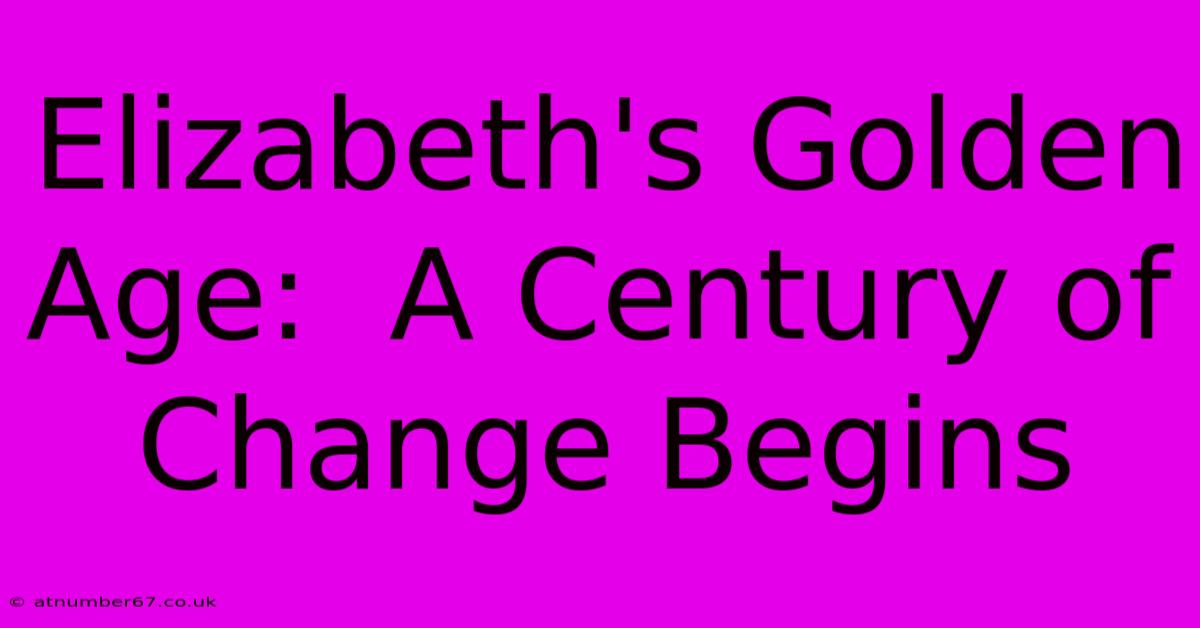Elizabeth's Golden Age: A Century Of Change Begins

Table of Contents
Elizabeth's Golden Age: A Century of Change Begins
The reign of Queen Elizabeth I, spanning from 1558 to 1603, is widely regarded as a golden age in English history. This period wasn't just a fleeting moment of prosperity; it marked a significant turning point, laying the groundwork for a century of profound change in England's political, social, and cultural landscapes. This article delves into the key aspects that shaped Elizabeth's reign and its lasting legacy.
The Political Landscape: Stability and Power
Elizabeth's ascension to the throne after the tumultuous reigns of Mary I and Edward VI brought a much-needed sense of stability. Navigating the complex religious and political divisions inherited from her predecessors, she skillfully avoided outright religious war, establishing a religious settlement that aimed for a degree of compromise. This "Elizabethan Settlement" balanced Protestant reforms with elements of Catholic tradition, avoiding extreme measures that could have ignited widespread conflict. While not universally loved, the relative peace it fostered contributed significantly to the flourishing of England during her reign.
Mastering Foreign Policy
Elizabeth's shrewd foreign policy played a crucial role in maintaining stability. She expertly navigated alliances with powerful European nations, skilfully avoiding major wars while furthering English interests. Her cautious approach, contrasted with the more aggressive policies of some of her contemporaries, allowed England to focus on internal development and consolidation of power. She expertly managed the threat posed by Spain, a major European power, using diplomacy and strategic alliances to prevent large-scale conflicts.
Economic Prosperity: The Seeds of a Maritime Empire
The Elizabethan era witnessed a significant expansion of England's economy. The growth of merchant capitalism fuelled the burgeoning of trade and commerce. Exploration and colonization, particularly in the Americas, fueled this economic expansion, opening new markets and bringing vast amounts of wealth to England. The establishment of the East India Company in 1600 marked a pivotal moment, marking the early stages of Britain's future global maritime empire.
Growth of Trade and Commerce
This economic prosperity wasn't limited to overseas ventures. Domestic trade flourished too, with advancements in agriculture and manufacturing contributing to a growing middle class. The influx of wealth from trade and colonization enriched the kingdom, providing funds for further investment and development. This burgeoning middle class fostered social change, empowering a new segment of society previously largely sidelined.
Cultural Flourishing: The Renaissance in England
Elizabeth's reign is synonymous with a remarkable cultural flourishing, often described as the English Renaissance. This period witnessed an explosion of creativity in literature, theatre, music, and the arts. The works of William Shakespeare, Christopher Marlowe, and Edmund Spenser stand as testament to this cultural zenith. The flourishing of the arts in this era elevated English culture to new heights, creating a legacy that continues to inspire and influence artists and audiences today.
Shakespeare and the Elizabethan Theatre
Shakespeare's plays, deeply intertwined with the cultural fabric of the time, explored themes of love, betrayal, ambition, and justice against the backdrop of Elizabethan England. The popularity of the theatre at this time and the works of Shakespeare remain influential even in modern times.
Lasting Legacy: A Foundation for Future Greatness
The Elizabethan era laid the groundwork for many of the developments that would shape 17th-century England and beyond. The religious settlement, though imperfect, brought relative stability, paving the way for future political and social reforms. The economic expansion created a foundation for the growth of a global empire, while the cultural achievements left an indelible mark on the English language and artistic tradition.
Elizabeth I's reign, often romanticized as a Golden Age, represents much more than a period of artistic and economic success. It represents a period of transition, stability amidst turbulent times, and a foundation built upon which England would continue to grow and evolve. Her legacy continues to resonate, reminding us of the importance of strong leadership, shrewd diplomacy, and the fostering of creativity in shaping a nation's destiny. The seeds of change sown during her reign blossomed into the burgeoning global power England would become.

Thank you for visiting our website wich cover about Elizabeth's Golden Age: A Century Of Change Begins. We hope the information provided has been useful to you. Feel free to contact us if you have any questions or need further assistance. See you next time and dont miss to bookmark.
Featured Posts
-
Fort Worth Tornado Rebuilding Homes And Hearts
Apr 01, 2025
-
Bugoy Carino Age An Icons Timeless Appeal
Apr 01, 2025
-
Beyond The Bible Exploring The Life Of Isaacs Son
Apr 01, 2025
-
Chebukatis Daughter Beyond Her Fathers Fame
Apr 01, 2025
-
How Antonio Browns Net Worth Compares To Other Players
Apr 01, 2025
